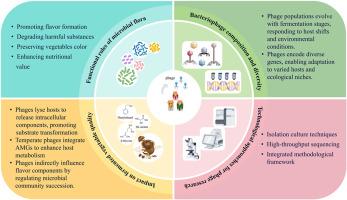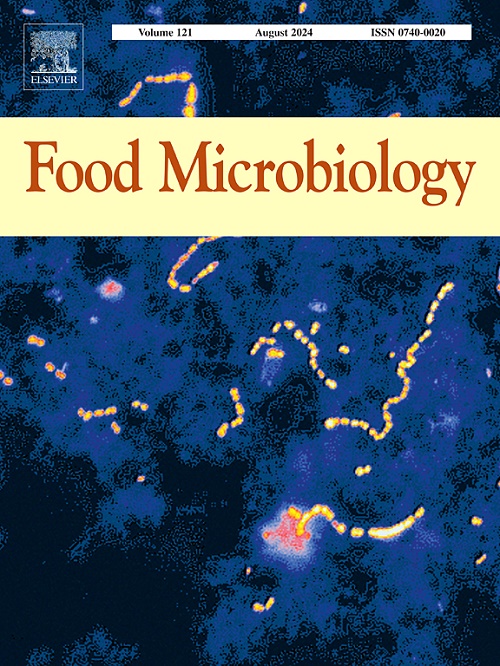菌菌体在发酵蔬菜中的生态存在及其功能作用
IF 4.6
1区 农林科学
Q1 BIOTECHNOLOGY & APPLIED MICROBIOLOGY
引用次数: 0
摘要
发酵蔬菜因其独特的风味和营养价值而受到消费者的广泛青睐,其品质属性与微生物群动力学密切相关。高通量测序技术的最新进展揭示了发酵蔬菜微生物组中丰富的噬菌体资源。这些病毒成分通过调节微生物群落结构和功能,显著影响发酵过程和产品特性。然而,通过噬菌体介导调控优化蔬菜发酵过程的研究仍处于起步阶段。本研究系统地总结了发酵蔬菜中微生物群落的组成特征和动态规律。本文综述了发酵蔬菜中噬菌体多样性及其功能特性的最新研究进展。此外,通过整合多组学数据,我们可以深入了解噬菌体、宿主微生物群和代谢产物之间复杂的相互作用网络。结果表明,噬菌体通过裂解-溶原循环介导微生物群落演替,并通过编码辅助代谢基因参与关键风味化合物的生物合成,从而精确调节发酵过程。最后,梳理了宏基因组学与文化基因组学相结合的综合技术框架。本研究为进一步认识菌菌体在发酵蔬菜中的作用机制提供了新的思路,为开发基于菌菌体调控的精密发酵技术提供了理论基础。本文章由计算机程序翻译,如有差异,请以英文原文为准。

Ecological presence and functional role of bacteriophages in fermented vegetables
Fermented vegetables are widely favored by consumers for their distinctive flavors and nutritional value, with their quality attributes being closely associated with microbiome dynamics. Recent advances in high-throughput sequencing technologies have revealed abundant bacteriophage resources within the fermented vegetable microbiome. These viral components significantly influence fermentation processes and product characteristics by modulating microbial community structure and function. However, research on optimizing vegetable fermentation processes through bacteriophage-mediated regulation remains in its nascent stage. This study systematically summarizes the compositional characteristics and dynamic patterns of microbial communities in fermented vegetables. We review the latest research progress on bacteriophage diversity and functional properties in fermented vegetables. Furthermore, by integrating multi-omics data, we provide insights into the complex interaction network among bacteriophages, host microbiota, and metabolic products. The results demonstrate that bacteriophages precisely regulate the fermentation process by mediating microbial community succession via lytic-lysogenic cycles and participating in the biosynthesis of key flavor compounds through encoded auxiliary metabolic genes. Finally, we sort out an integrated technical framework combining metagenomics and culturomics. This research provides novel insights into understanding the functional mechanisms of bacteriophages in fermented vegetables, offers a theoretical foundation for developing precision fermentation technologies based on bacteriophage regulation.
求助全文
通过发布文献求助,成功后即可免费获取论文全文。
去求助
来源期刊

Food microbiology
工程技术-生物工程与应用微生物
CiteScore
11.30
自引率
3.80%
发文量
179
审稿时长
44 days
期刊介绍:
Food Microbiology publishes original research articles, short communications, review papers, letters, news items and book reviews dealing with all aspects of the microbiology of foods. The editors aim to publish manuscripts of the highest quality which are both relevant and applicable to the broad field covered by the journal. Studies must be novel, have a clear connection to food microbiology, and be of general interest to the international community of food microbiologists. The editors make every effort to ensure rapid and fair reviews, resulting in timely publication of accepted manuscripts.
 求助内容:
求助内容: 应助结果提醒方式:
应助结果提醒方式:


